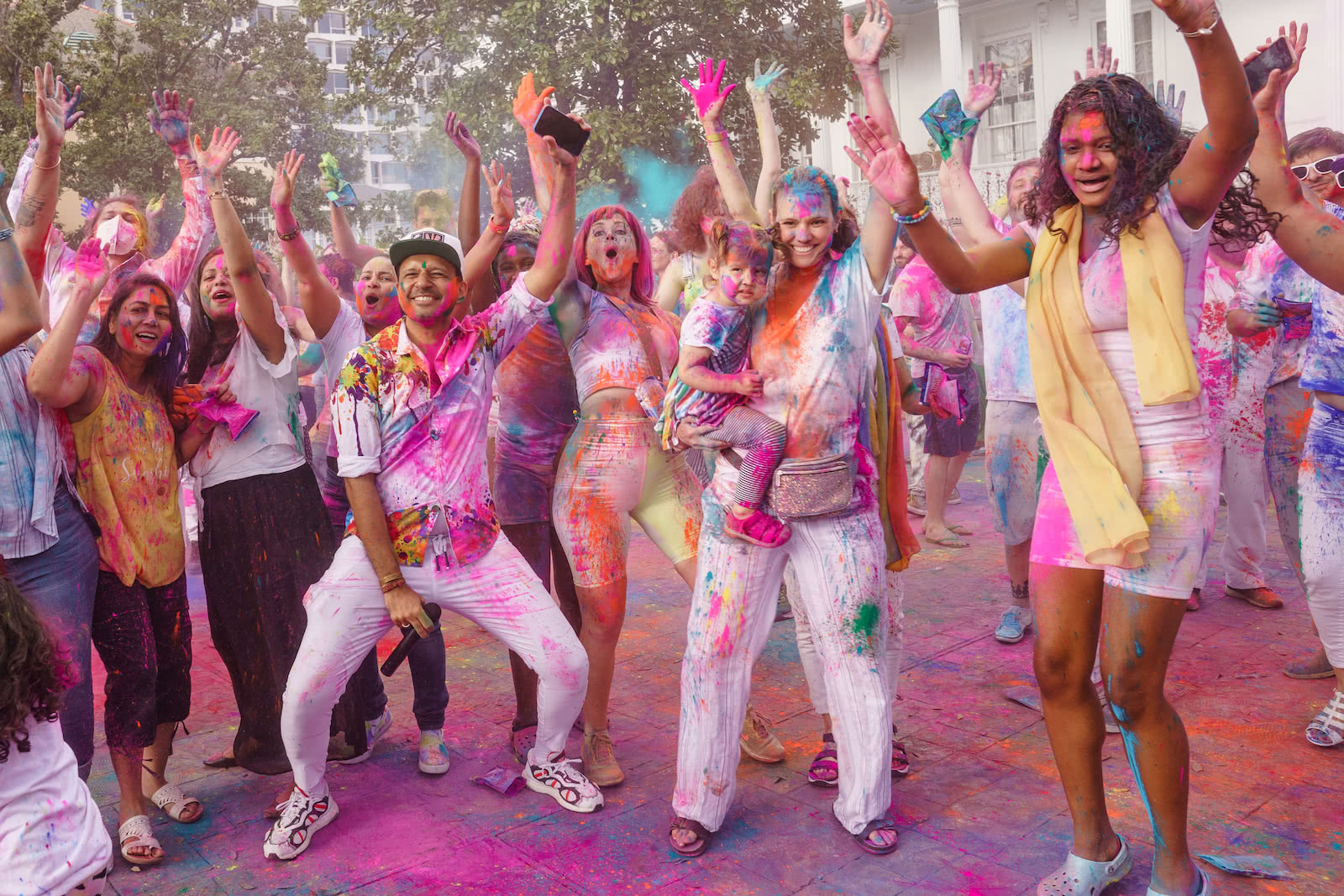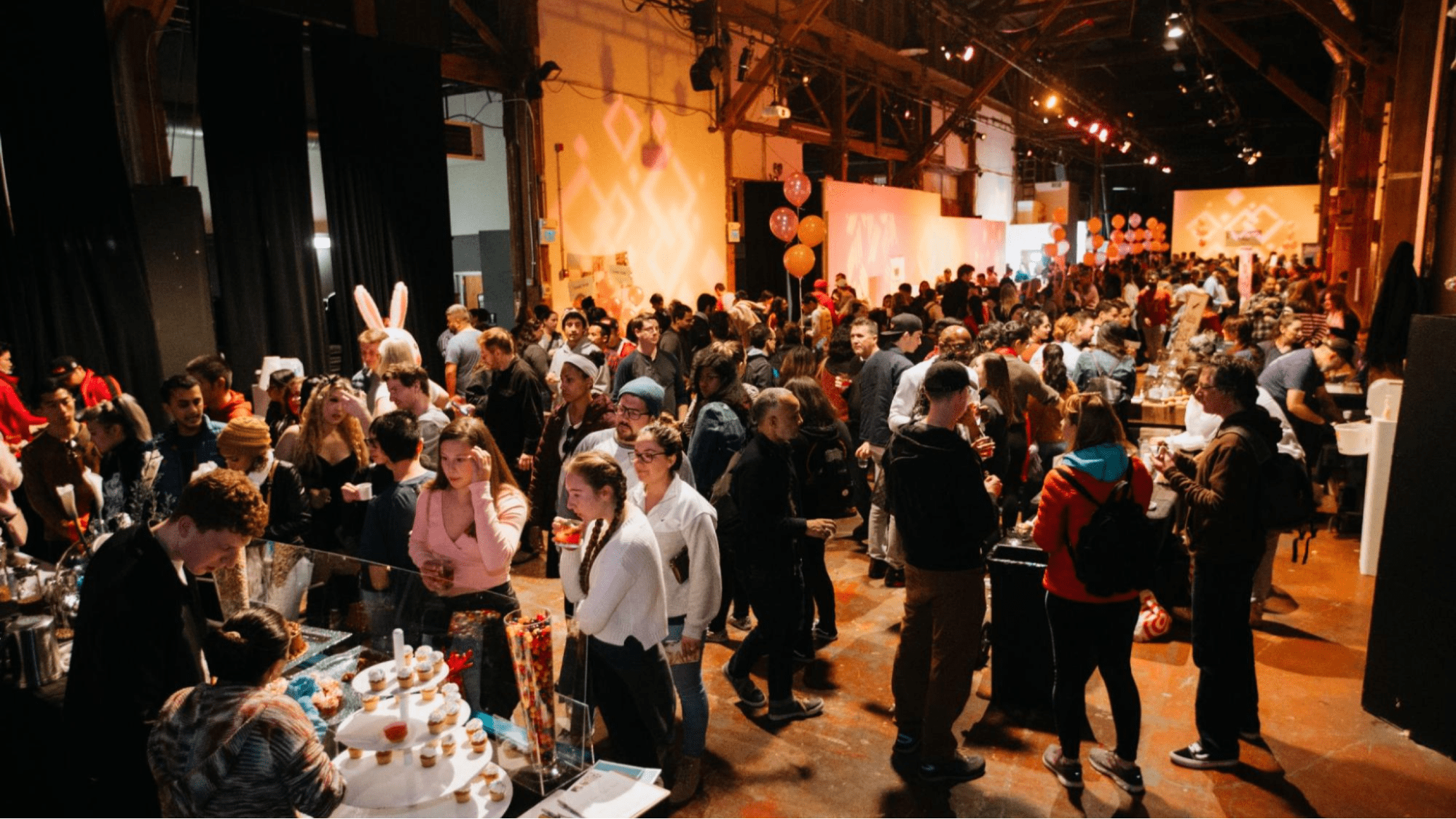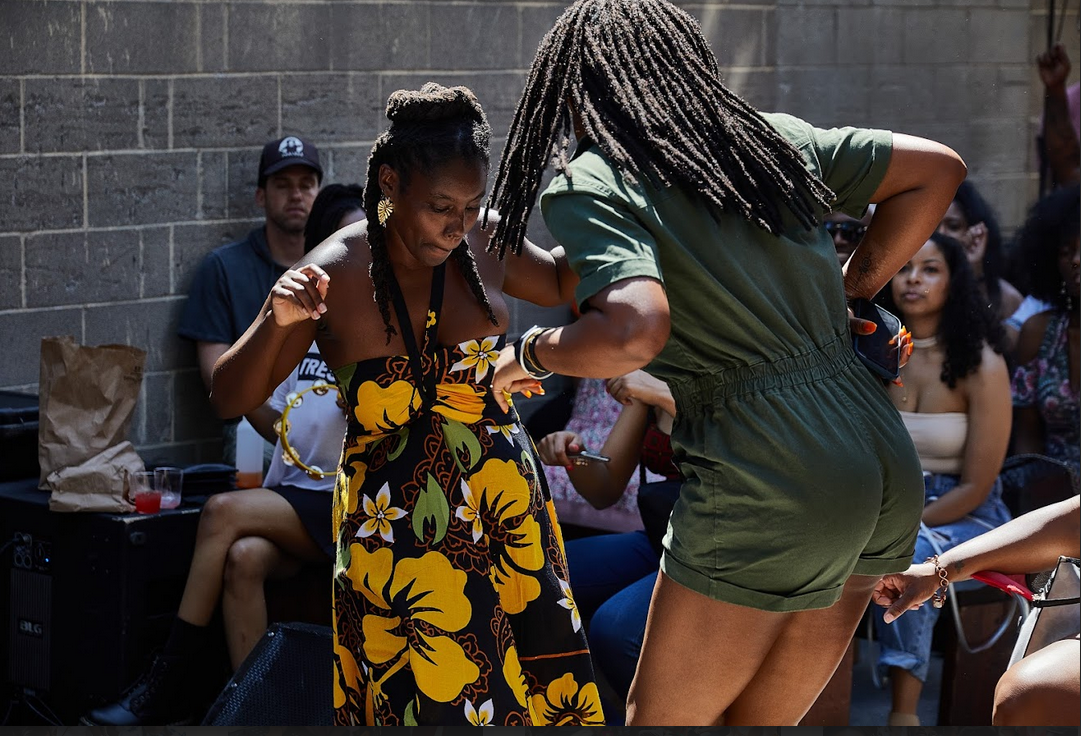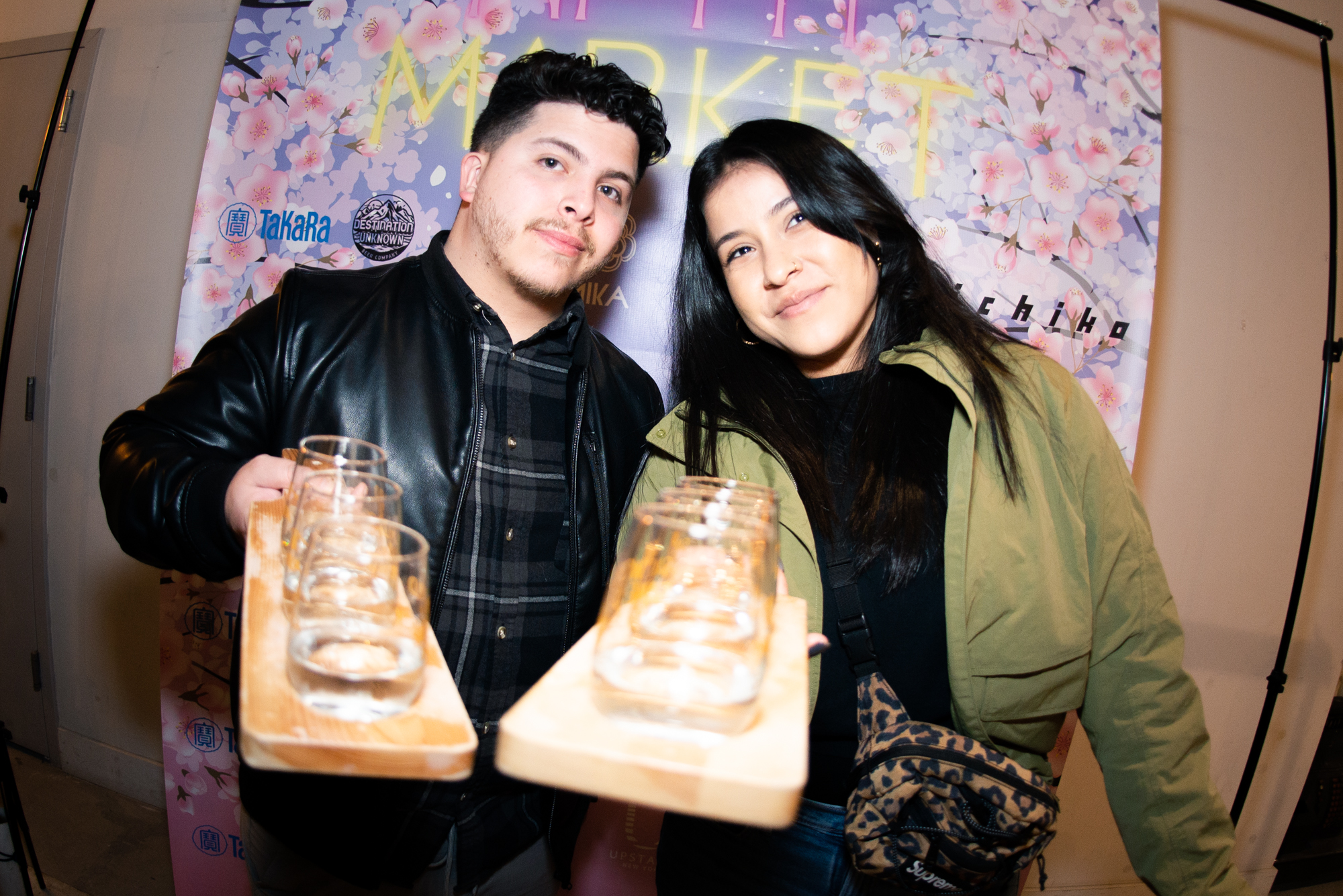The Ultimate Event Marketing Guide: Strategy, Timelines & Templates
If you’ve ever run an event, you’ll know that they unfortunately don’t sell themselves. In order to sell tickets, you need to be armed with an event marketing strategy that effectively promotes your event to your target audience, whether you’re planning on hosting in person or online.
But how do you go about creating one? In this guide, we’ll be exploring the different types of event marketing strategies you can use to create an event marketing timeline (with each promotion reinforcing the last), and how to ensure the right message is delivered at the right time — and to the right people.
Table of contents
Create a winning event marketing strategy
Event marketing timeline + tactics to sell out your event
What is event marketing?
Event marketing is defined by the tools, techniques, and channels you use to promote an event to an audience – usually with the hope of getting them to buy tickets or attend.
Event marketing begins with launching an event idea through to persuading attendees to invite their friends or colleagues and attracting a steady pipeline of leads through channels such as email marketing, blogging, and advertising.
What is B2B event marketing?
B2B (business to business) event marketing means selling an event to other businesses in order to get them to attend, sponsor, or exhibit. The channels of advertising may be the same as selling to the wider public (such as social media, email marketing, or pay-per-click (PPC) but the tone of voice and USPs may be different.
For example, at a consumer event, the sales techniques will be activated towards personal interest and benefit. But for a business event, the rewards may need to be more tangible, such as helping a business to increase revenue, generate leads, or gain a competitive advantage.

Create a winning event marketing strategy
It’s impossible to present a perfect “catch-all” event marketing plan – every event is different, as is every lead time, budget, and target market.
For example, you might be planning a virtual masterclass or an in-person festival, and each option requires its own promotional plan. However, there are tactics, tips, and strategies that should help guide you no matter what type of event you’re marketing.
Think unique
What is your event’s unique selling point? Whether you’re running a festival with a unique line-up of artists, hosting a panel of industry-leading experts, or organising a pop-up dining experience in a new secret location, focusing on your event’s USP is key to an effective marketing strategy.
Get attendees excited by centring your communications on what makes your event stand out. In a nutshell: what can attendees gain from your event that they can’t find elsewhere?
Creator example: Swiftogeddon’s USP is a powerful one: they’re the only Taylor-Swift-themed club night in the UK. As the only music event dedicated to ‘worshipping at the altar of Taylor Swift’, their marketing is full of fun lyric wordplay and a clear focus on fan-favourite songs — establishing themselves as the go-to event for all Swifties.
2. Ask ‘why?’
Why should people attend your event? There are many reasons attendees might buy tickets — and tapping into these motivations is key. For a workshop or seminar, guests might be there to learn a new skill, such as coding, a new language, or still-life drawing.
At a music festival, fans may attend to see their favourite artist at an exciting local venue. For a wine tasting, attendees might want to discover wine from an unusual region, or gather inspiration for food pairings.
Switch your perspective to the viewpoint of your audience to consider what they will gain from your event and how they will benefit — and use this to create your marketing messaging.
Creator example: Tapping into attendee motivations when marketing a careers fair is essential — and the UK Careers Fair does exactly that. Knowing attendees want to network, gain knowledge about career opportunities, and fine-tune their CVs helps the organisers to market their events in over 60 locations across the UK successfully.
3. Keep it simple
Keeping your messaging simple is an excellent way to attract your audience. From punchy social media campaigns to snappy email subject lines, you should be able to promote your event succinctly.
To do this, perfect your elevator pitch: can you describe the event — and its value — in one short sentence? When you’ve crafted the perfect pitch, use this to share with partners and stakeholders, as well as your audience, for crystal-clear marketing.
Creator example: A book club with a boozy twist: that’s the elevator pitch for Brunch Book Club’s Book Lovers’ Wine Club. By marketing their event with a clear purpose — to discuss books over a glass or two — and a specific audience (bookworms and wine fans) they keep things simple and compelling.
4. Create audience profiles
Who is your target audience, and how well do you know them? The key to refining your marketing messaging is creating detailed audience profiles — and imagine you’re marketing your event to these people.
You may have multiple audiences for one event — for example, both wine beginners and connoisseurs may be interested in attending a tasting — so make sure to create different personas for each of them.
What does each attendee aim to gain from your event? Do they have a problem that can be soothed or solved by attending? How does your event help them to achieve a goal? By creating different audience personas, you can tailor your marketing according to their goals, pain points, and motivations — and boost your ticket sales.
Creator example: Global games company Square Enix markets its events with a clear idea of its target audience. For its games-themed conventions, like its Final Fantasy XIV Fan Festival, an understanding of audience priorities — the opportunity to play the game, meet other players, and win prizes — is vital to creating a festival that attendees love.
5. Get creative
How can you further encourage attendees to purchase tickets? Throughout the attendee journey, your audience will encounter various touchpoints — from interactions with your brand on social media to opening a marketing email.
Get creative with your event marketing strategy by considering different factors at play that may tip potential attendees into buying a ticket at various touchpoints. This might mean including reviews, photos, or videos from previous events as social proof, including attendee satisfaction statistics — or offering early bird pricing on your tickets.
Creator example: Creative Mentor Network markets their events by showcasing their work helping young people in the creative industries. Whether that’s including statistics on their event pages — for example, helping over 1000 young people — or using previous mentors and mentees to promote their events, there are a range of social proof touchpoints to encourage guests to buy tickets.

Youth Marketing Strategy / YMS
Event marketing timeline + tactics to sell out your event
Did you know a customer will engage with your brand an average of seven times before they’re likely to buy a ticket? With that in mind, an effective event marketing strategy is all about raising awareness of your event.
You want to direct potential attendees and previous attendees to the “awareness” stage of your marketing funnel, so that you can inform and advise them as they make the journey towards buying a ticket.
For those who are already aware of your event, you’ll want to help move them toward the purchase and advocacy stages. Here are some of the best event marketing strategies to consider from beginning to end.
Pre-event launch
Create buzz before you launch your event with effective marketing and strategic collaboration.
Social media
Using social media early is one of the best event marketing strategies as it’s key to creating momentum for your event promotion. Depending on the nature of your event and where your target audience typically engages with content online, you might choose to use Facebook, Twitter, Instagram, TikTok — or other platforms like Snapchat or Reddit — to expand your reach.
Whether you’re announcing exciting new bands on the line-up for your festival or dropping clues for the film at your secret screening, there are a number of ways to use social media to boost engagement with your event before you open ticket sales.
You can generate buzz by running social media giveaways, creating an event hashtag to engage with your community, and drip-feeding exciting information about your event in the run-up to the launch. Discover more tips on how social media can fit into your event promotion timeline.
Partner outreach
Event marketing partnerships and sponsorships can be crucial to your event’s success, so you need to start reaching out to potential collaborators, complementary brands, and media partners early.
Make sure to consider collaborations with brands and figures who fit with the goals, mood, and style of your event — whether that’s a respected figure in the local food scene or a brand whose values fit in with your charity fundraiser.
Not only are they more likely to partner with you on your event if your values align, but their networks will be far more likely to attend. Getting in touch with potential event partners early is a great way to start spreading the word from the very beginning — and you can begin to utilise their platforms to boost your marketing.
Leverage influencers
Did you know that, according to Hubspot, 1 in 4 marketers are using influencers in their promotion strategy — and it offers the second highest ROI of any marketing trend?
Beyond partnering with brands, partnering with influencers can be a great way to help your event reach a wider, highly engaged audience. This is also where it’s helpful to remember your audience profiles and personas: which influencers are they likely to follow?
Whose endorsements are they likely to pay attention to? To find the right influencers to partner with, consider their reach and resonance with your target attendees, and compile a list of potential partners to reach out to.
Once you’ve found your influencers, it’s a good idea to ask them to promote your event on their social channels — including Instagram, TikTok, and Snapchat.
That might include creating a post or video spreading the word about your event, offering an exclusive discount code, or running a giveaway competition on their page to offer free tickets to their audience.
You can also get creative by hosting a Q&A on their socials or asking them to engage with your brand in other ways in the lead-up to the event — for example, showcasing your brand’s product or service on an Instagram reel.

SweetSpotSF Dessert Festival / SweetSpot / San Francisco, CA
Event launch
Once your event is launched, it’s time to start driving ticket sales with email marketing and press releases.
Email marketing
Email is a crucial tool in your event promotion plan. With your event now ready to be launched, you should get your first major email out to your potential attendees. For the first wave of tickets, the aim is to get attendees buzzed for what’s to come. Keep your subject line short and snappy — and entice attendees with your event’s USP.
Throughout the event marketing lifecycle, you’ll want to send a range of emails to keep your audience engaged at every touchpoint — first launch, in the run-up to the event, several weeks before, and a few days before.
At every stage, Eventbrite’s email marketing tools and real-time analytics make it easy to level up your promotion strategy, find the people most likely to attend your event, and boost your ticket sales.
Press coverage
Gaining press coverage can help to amplify your event beyond your own network and can increase ticket sales. It will also help to build your future brand strategy, increase links to your website, and potentially boost traffic for future events.
To target the right publications, consider the titles your audience typically reads — as well as journalists that specialise in your event type, whether that’s music criticism or food writing.
Here are a few tips on writing a good press release:
-
- Come up with a compelling hook and find your unique story angle. Why is your event new, exciting, a first, or a novelty? Does the event have an interesting backstory? Are there any exciting figures attending?
-
- List the basic details of your event — such as date, time, location, and special guests — and include a link to your event page. Keep things simple to help the journalist find key information easily.
-
- Add value to your press release and increase the chances of gaining coverage by offering free tickets — such as VIP or press passes. You could also offer interviews with yourself, other organisers, or event partners.
Promotional videos and reels
Captivate your audience in the lead-up to your event with engaging videos you can share across social media and in your email campaigns. From short teaser clips to longer reels, videos are essential to your event marketing — in fact, 78% of event marketers say video helped increase their sales.
For social media, create short, snappy clips to give attendees a flavour of the event. Choose captivating visuals, catchy music, and soundbites from previous attendees.
Whether you’re hosting a festival, a workshop, or a panel, one of the best ways to market your event is to show other attendees enjoying themselves. This is known as social proof and a great way to do this is to use video from previous events.
You might also choose to create longer videos on YouTube for a more in-depth look at your event. This could include Q&As with your event partners — such as speakers or artists — as well as vox-pop style interviews with attendees from a previous event.
You can also get creative with video by using it to announce exciting details in the run-up to your event, such as other acts on the festival line-up, new guest speakers, or added perks for attendees.

Early bird
After you’ve launched your event, boost ticket sales further by promoting early bird registration and reaching a wider audience with content marketing.
Early bird discounts
Once you’ve enjoyed the initial launch excitement for your event, you’ll need to encourage people to register (and register now rather than later). This is where you can incentivise sales using early bird registration.
Early bird discounts work by staggering your ticket sales to go up in price as you get closer to the event. It’s not uncommon to have more than one round of price tiers.
The rest of your marketing activity should be geared towards building up interest and leads in the run-up to the expiry of your discounts, helping you to create spikes in ticket sales. Alongside discounted ticket prices, you might also choose to offer other incentives for those who buy tickets early — such as booth reservations, drinks packages, or free samples or merchandise.
Don’t forget to include the early bird discounts on your social media and email marketing too — and encourage your event partners to spread the word among their networks.
In-depth content marketing
Continue to drive interest in your event with strategic content marketing. The type of content you choose to create will differ depending on the nature of your event, but it should be engaging, valuable and in-depth — and should be something only you could write.
For instance, if you’re hosting a music festival, you might choose to write compelling long-form interviews with the bands and artists on the line-up and pitch this to a music publication.
If you’re a wine connoisseur hosting an expert tasting event, you could write a detailed article on wine from a specific region alongside unique food pairing ideas — a great way to showcase brand authority and generate interest in your upcoming event.
The key to successful content creation is similar to marketing your event: focus on your USP. What can you offer with your content that other creators can’t?
Whatever your approach to content, make sure it is audience-oriented — so keep your target attendees in mind. This means creating a piece that is engaging, well-researched, well-written, and detailed — offering real value to your readers.
According to one study, 83% of marketers agree that quality should be prioritised over quantity when it comes to content, even if it means creating less often.
Creating content is an effective way to engage your target audience, increase visibility for your event (via publication readership and social shares), and ultimately boost your ticket sales.

Last chance to save
As your event approaches, amp up the momentum by running paid campaigns and incentivising attendee referrals.
Paid promotion
Whether it’s paid social media advertising, Google Ads, or retargeting, now’s the time to put cash behind your campaign. Paid promotions are a great way to reach a wider audience in the lead-up to your event — adding countdown-style copy to let attendees know that it’s their last chance to grab tickets is always an effective tool.
You could concentrate your spend just a couple of weeks before each early bird offer, or a few days before your event launch. Before running paid promotions, you’ll want to know that your efforts will pay off — that’s why Eventbrite’s smart social media ads make it easy to reallocate your budget to the audience segments bringing in the most clicks, engagement, and sales. For more tips on paid promotion, check out our complete digital marketing guide.
Attendee referrals
Many organisers focus solely on bringing in new attendees, forgetting that they have a strong network of potential advocates that they can already tap into.
Word of mouth is consistently shown to be one of the most powerful and effective marketing tactics. So, why not reach out to your existing attendees and incentivise them to promote the event on your behalf? You could even offer referral fees if they become an affiliate, which is easy to track and manage with Eventbrite.
Giveaways
Just before your event date, amp up interest on social media by running a giveaway competition. From branded hashtag contests to sweepstakes entries, there are a number of ways to get creative and get potential attendees excited about your event.
You could offer free tickets to your event for new attendees — or add extra fun into the competition by offering attendees with tickets the chance to win VIP upgrades or add-ons, such as free drinks or merchandise. Encourage users to enter the giveaway by spreading the word, tagging friends, and re-sharing your tweet, video, or post.
Giveaways are also a great way to grow your following and boost brand awareness: Instagram contests get 3.5 times as many likes and 64 times more comments on average than regular posts.

Event opens
On the day of your event, it’s time to return to your marketing tools for one last push for ticket sales.
Final push
Whether you’ve been marketing for a matter of months or weeks, the final few days always call for a last push. This will probably be a combination of social media posts and emails encouraging last-minute sales.
It’s a great idea to utilise social proof — and social media — at this stage, and engage with attendees ahead of the event to generate excitement. From song requests to outfit choices, there are a number of ways to interact with your guests, encourage them to share on social media, and show the world who’s attending your event.
Your social media and emails should now take on a more urgent, sales-focused message as you’ve spent the past few weeks or months building up a relationship. Now’s the time to be super clear with your direct calls to action and convert that long-term strategy into ticket sales.
Post event
After your event, your marketing strategy doesn’t stop there — make sure to use positive reviews and photos to sell your next event.
Use material to market your next event
In the lifecycle of events marketing, your previous event can fuel your next — so make sure to utilise your material. Positive reviews are an excellent way to encourage attendees to purchase tickets for your next event, so sending out post-event feedback surveys to attendees should form part of your marketing strategy.
Boost your social proof by posting photos and videos of your event on social media — and encourage attendees to do the same. Showcasing the success of previous events — and how much attendees enjoyed them — is a surefire way to increase demand for your next event.

Refining your event marketing strategy
Whether you’re planning your pre-event launch or creating an early bird buzz, the roadmap above can help you shape and structure your event marketing strategy. For more tips on marketing your event, check out our event marketing kit complete with templates from industry leaders.
To refine your marketing strategy for your next event, take a look at what went well and what could be improved next time with our tips below.
Attendee surveys
One of the best ways to assess the success of your event is to pay attention to attendee surveys — so make sure you send these out a few days after the event. What did attendees most enjoy?
What would they like to experience more of next time? You might also want to ask your event partners — either with a survey, or informally by email, depending on how many brands or influencers you partnered with — similar questions, so you can build on what went well next time.
Attendee analytics
Alongside post-event attendee surveys, it’s also useful to take a look at the source of your sales. Did most ticket sales come from a particular demographic? If so, how can you target that demographic better next time? Did you generate a lot of sales after a specific social media ad campaign, or did the majority of registrations come from attendees with an influencer discount code?
Understanding the source of your sales and audience demographics is key to refining your marketing strategy and boosting your success for your next event. Eventbrite’s real-time analytics are an excellent way to assess your marketing efforts — giving you actionable insights into your audience profiles, ticket sales, and conversions.
Ready to market your own event? Download our event marketing template at the top of the page!